#charity - a god whose name was only ever meant to be ironic
Text
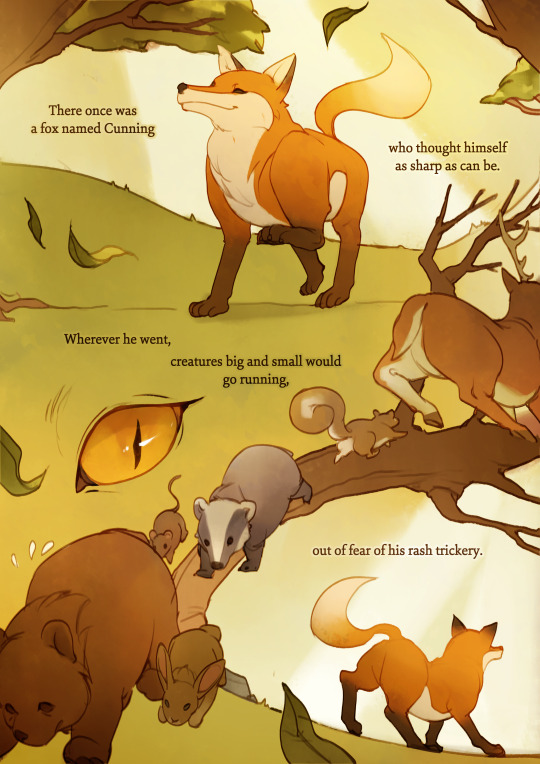
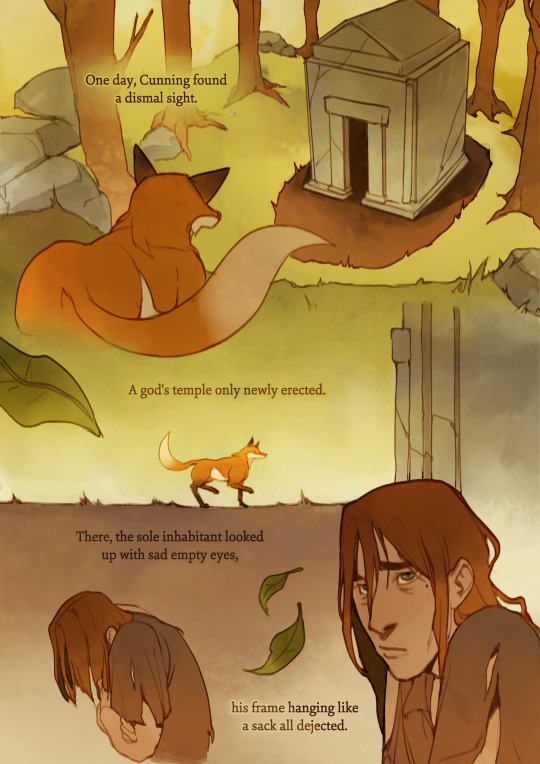
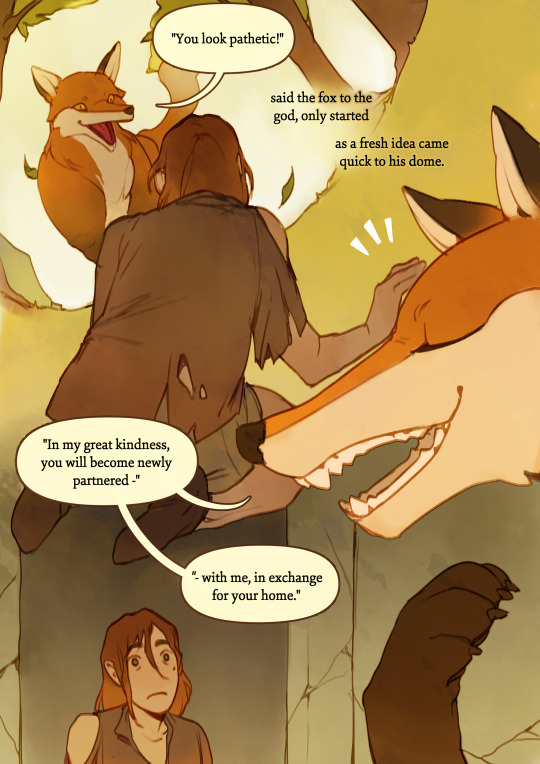
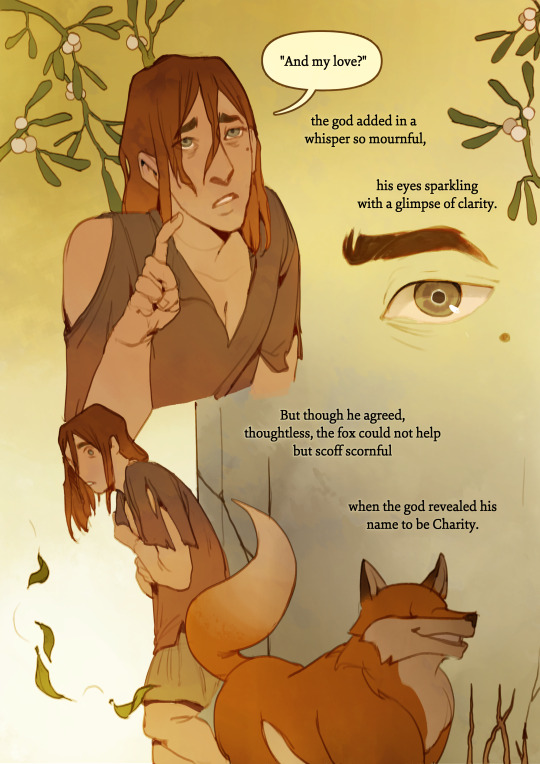

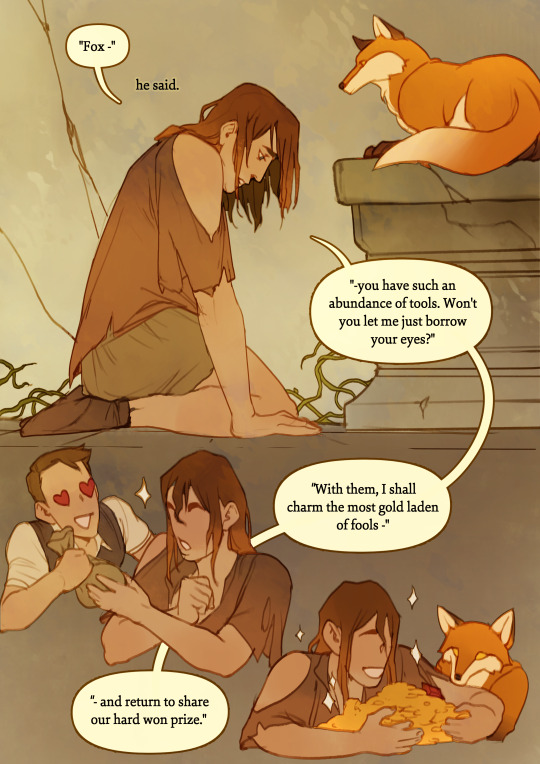
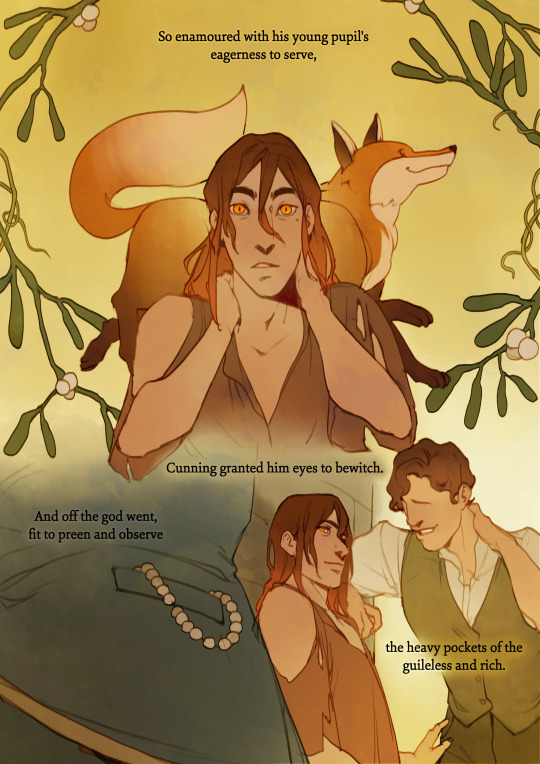
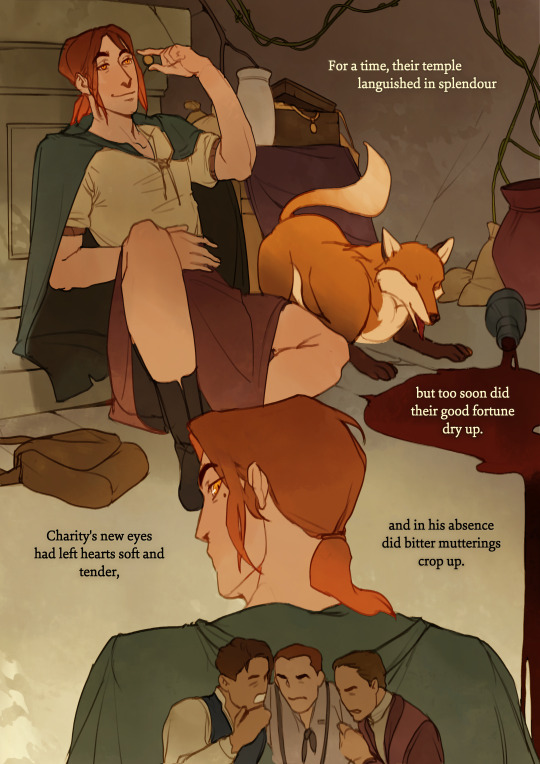
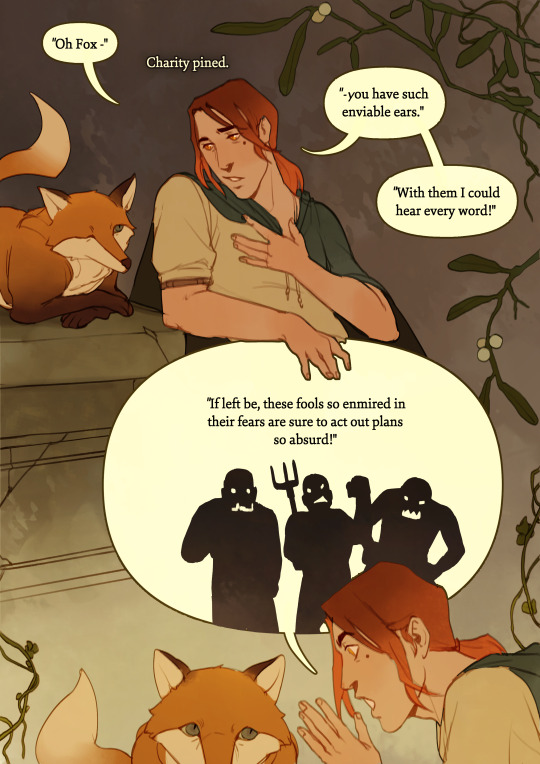
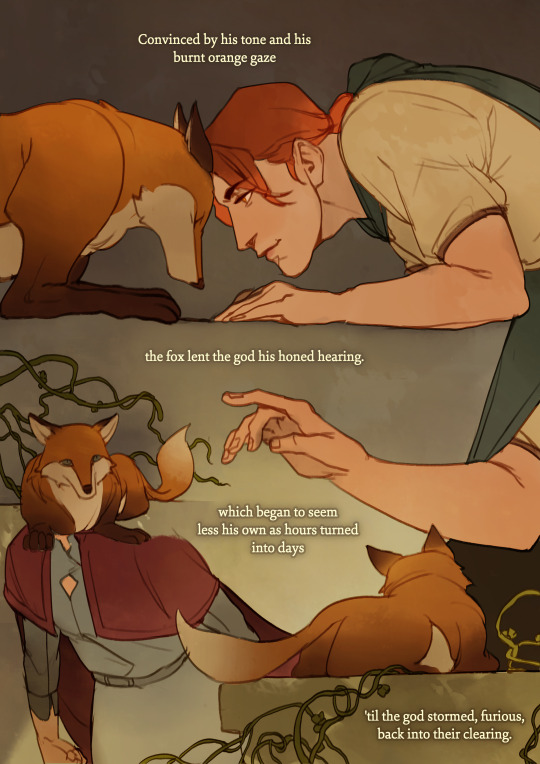
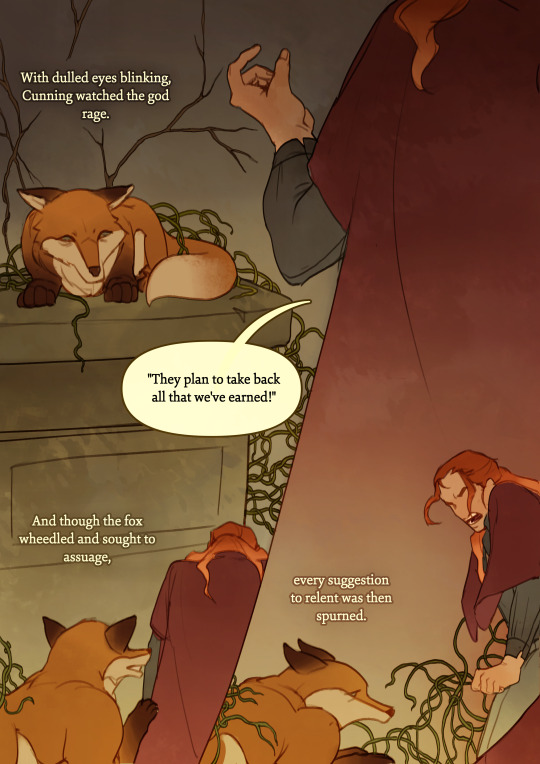
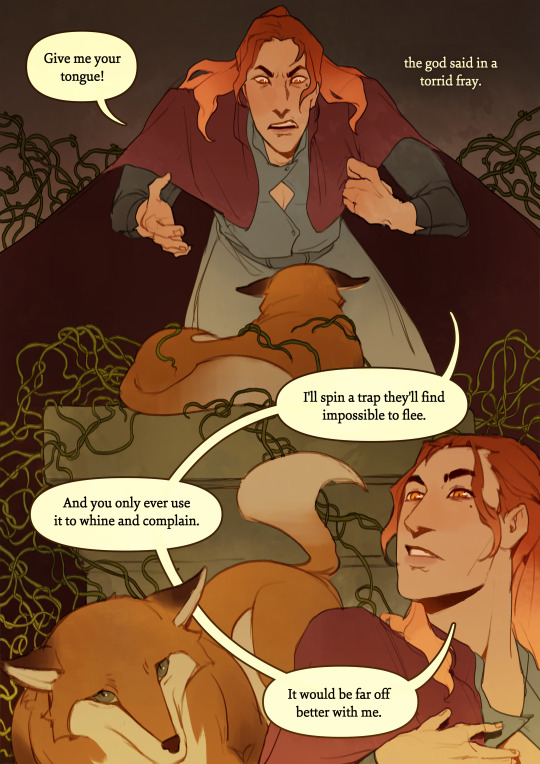
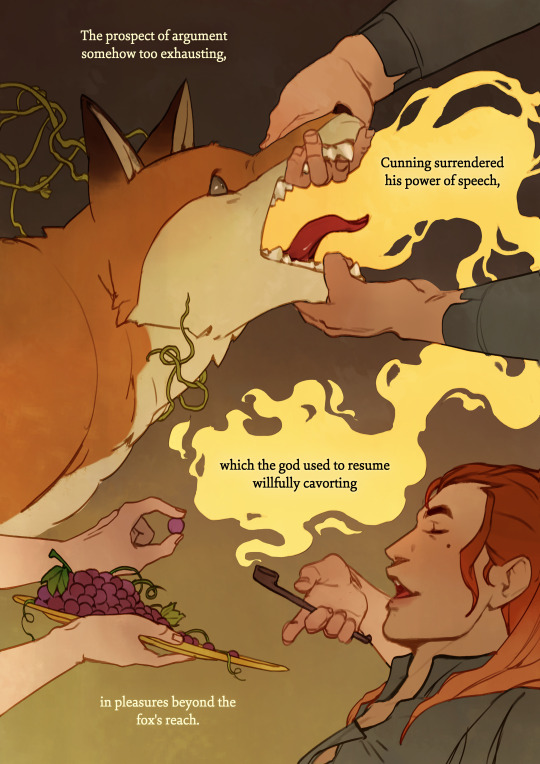
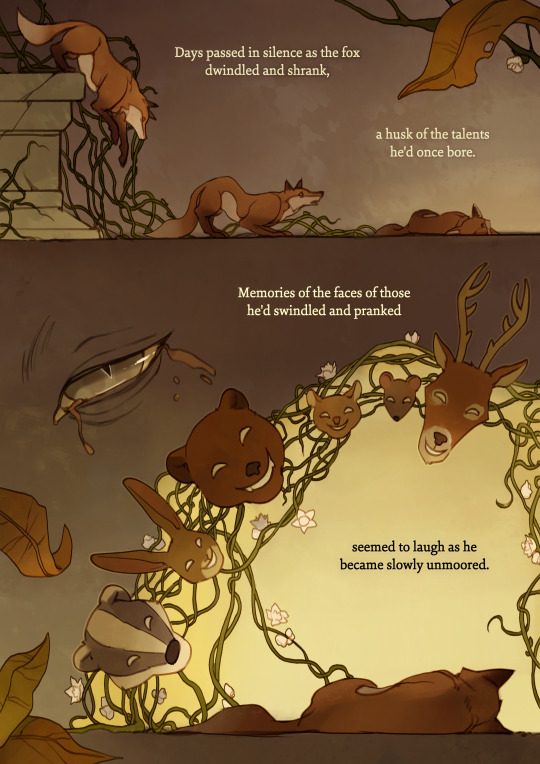
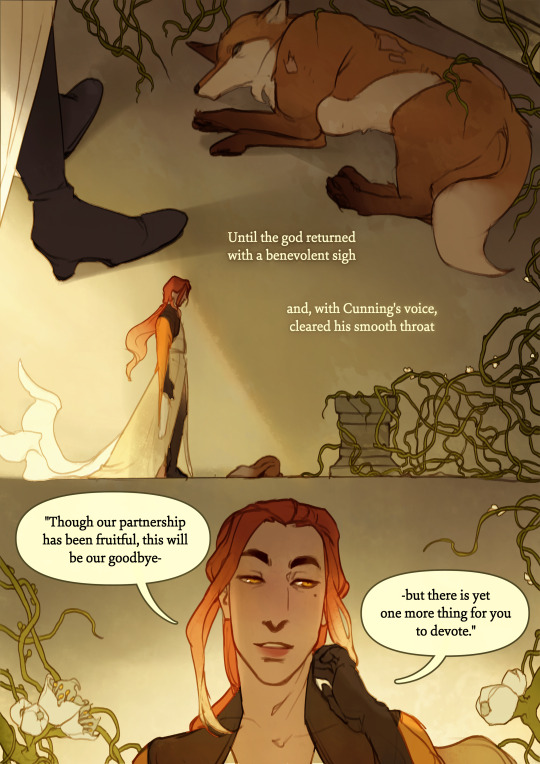
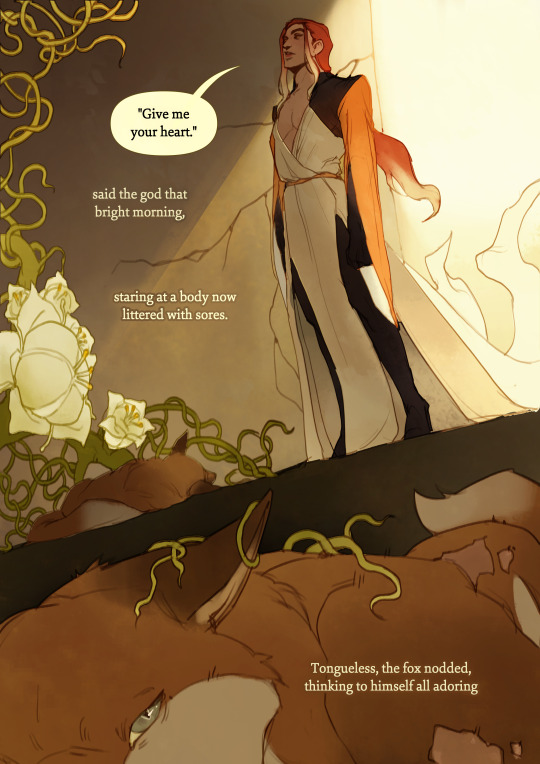
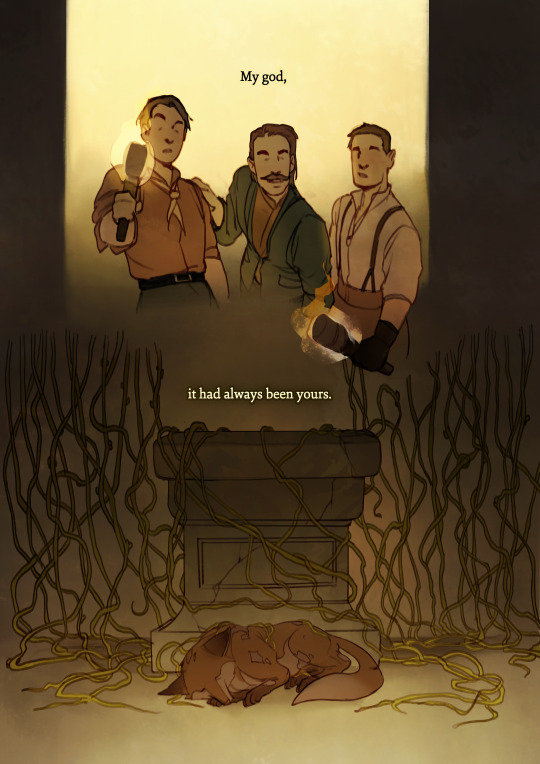
the fox god.
a comic about a trickster.
--
creative notes:
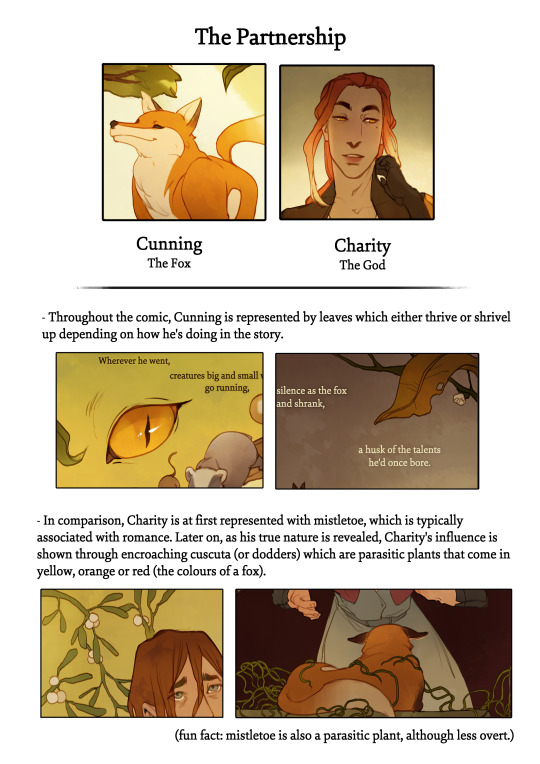

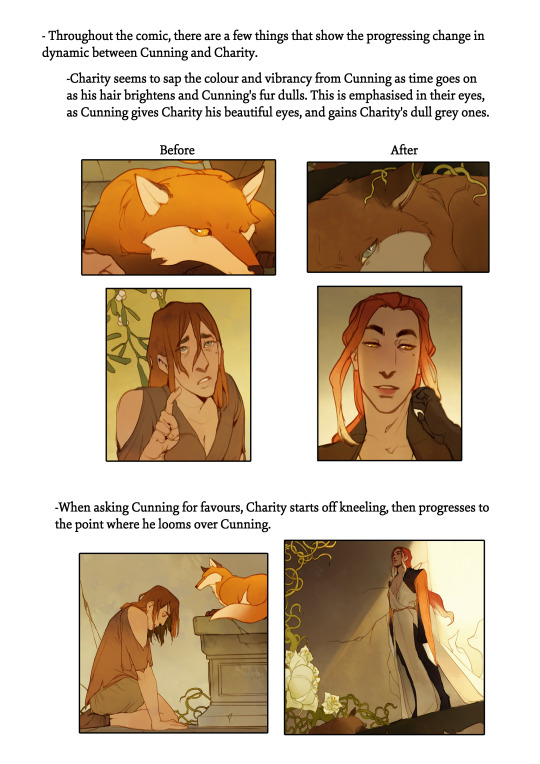
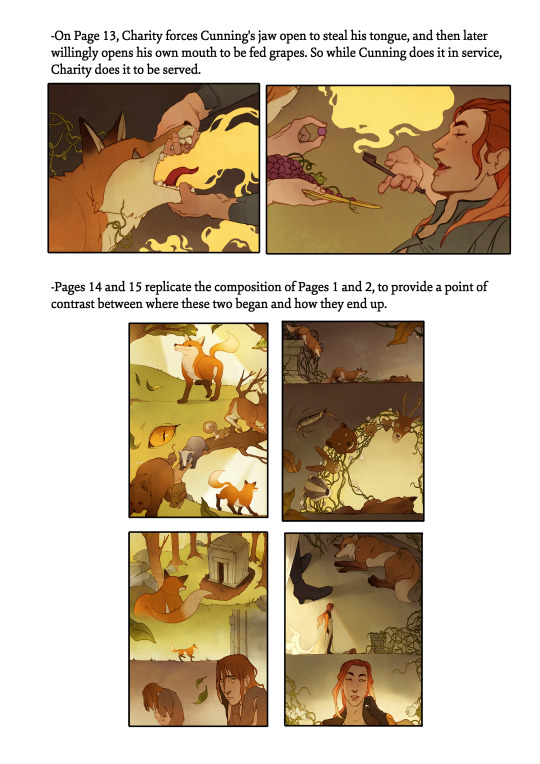
–
all my other comics
store
#cw: emotional abuse#cw: gaslighting#cw: animal death#charity - a god whose name was only ever meant to be ironic#i love playing with the concept of religion like this#im not religious at all but i did go to a christian school for twelve years#and i remember learning about the story of abraham. who long story short gets told by god to kill his son to prove his love for god.#and at the veeeery last minute god goes sike! this was a test to see if you'd do it! here's a lamb to slaughter instead#but the whole concept of that exchange in and of itself is so#anyway#one thing i meant to include in the creative notes but i ran out of room for is that charity never calls cunning by his name.#it's just “fox”. which was a small touch to indicate that he never acknowledged cunning's identity outside of being something exploitable.#but for all charity's hidden disdain for cunning#he still stole all his strengths and coveted them. he became known as the fox god.#so maybe some part of cunning survived. despite everything.#“give me your heart.”#“my god. it had always been yours.”#comic art#hearteaters#stillindigo art#stillindigo comics#one more comic to go until im finished with this collection!!
10K notes
·
View notes
Text
Need You | s.m
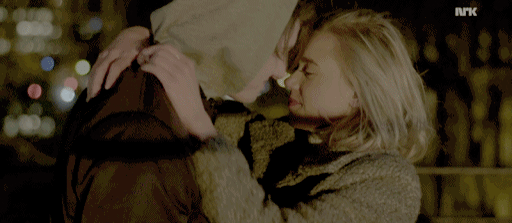
just.... angst (no this isn’t a series i just wanted to use a name kay) check the tags for a trigger warning PLEASE!
Teresa’s always been half a step behind on everything. Whether it was puberty and growing boobs overnight, finding a boyfriend, having her first kiss and eventually her first time, she was always the ‘It’ll happen, don’t worry’, or the ‘I’m sure you’ll find someone’ kind of a gal. Now, as she climbs up the stairs to her dorm, keys spinning around her fingers, whistling the tune to a country song, she realises that she’s half a step behind on life, too. She dressed up and she put on makeup and she did her hair and came back without anyone by her side and that isn’t fair, is it? Teresa, of all people, deserves someone walking her home. She deserves someone waking up next to her and not hating her for drooling all over their pillow. She deserves to come home to a funny, and if God’s gracious enough, cute guy.
She shakes her head, laughs a little at the joke her life’s become, and steps onto the landing of her floor. And then she stops in her steps, does a double take, and stares. (She might have gawked a little too, if she’s being honest.) When she said she that she deserved to come home to a cute, funny guy, she didn't mean Shawn. Well. Shawn’s funny, at times, and he's admittedly cute, too, but he looks like he's several steps behind on everything, more than she is, and that kind of upsets Teresa a little. She stands there a moment, watching his hunched figure, his blotched face and and his tear stained cheeks and the curls he'd obviously been running his hands through and thinks Fuck, I’m going to cry.
He hasn't noticed her yet, she assumes. He's staring at a wall and his eyes have this absent look in them and her heart’s beating against his chest because someone's hurt him. Someone's hurt him so, so, so terribly bad and for some godforsaken reason he's at her door and she's going to have to look at his face and pretend like she's okay. She isn't. She can't see people hurt, and if he's here then he either expects her to console him or talk to him or listen to him and. And Teresa's terrible at every single one of those things. She's good at whistling through her nose and blowing bubblegum bubbles and aligning frames just right without having to use a leveller but God is she terrible at all things emotional.
It's Shawn, though, and she considers him a friend. He has to consider her one too, if he's unabashedly upset and on her doorstep, so she silently closes the distance between the two. Takes her heels off at the stairs, and tiptoes her way over to her room. Shawn blinks, then, and looks up at her. And then his face twists, and sure, he might be the one crying, but she's the one whose heart twists into itself.
“I'm drunk,” Shawn admits, wobbly chin making her head hurt. He mumbles a little, reaching out to tug at the bottom of her dress. Teresa kneels in front of him, placing her heels on the floor, and pretends like she knows what she's doing. She doesn't. She doesn't even know why Shawn's here, of all places, since he has other, better friends and they barely know each other, but there's little she can do about it. She's The Chosen One tonight. She never knew a reference from her favourite book could leave such a bad taste in her mouth.
“Yeah?”
“Yeah, Tess.” Tess. He's never called her that before, has he? Has he ever called her anything apart from Acosta or dumbass? She doesn’t think so. “I'm so drunk.”
“Did you get lost?” She doesn't know what to do with her hands. Should she reach for his face, should she hold his hand, should she play with the strings of his hoodie? She doesn't know. Fuck. When Shawn reaches towards her, though, fingers brushing along her knuckles, she turns her palm upwards and interlaces their fingers. Good. He's doing most of the work.
“No.” He says, and then sniffs. Her lips pull down in a frown, and she decides that she's going to be here a while, so Teresa folds her legs under herself, and she listens to him talk. “I— I didn't get lost. I. Tess—” His voice breaks, and his head drops. Softly, as if ashamed, he mutters, “I need you.”
Teresa isn't going to lie. If there's one thing that life's taught her, it's to always be honest to herself. And to be honest, she's a little confused. A lot confused, actually. Sure, she considers them friends, and sure, he bought her coffee once, but that's it. That's all it ever was, all that it ever was supposed to be. A friend from class who she occasionally swapped notes with and asked for pens. But he's here now, and she can tell he's trying to push his tears back in, and he says he needs her. He doesn't know her, and he probably only knew where her dorm was because he stole her binder and had to return it, but he needs her right now. And she has to be there for him, no matter how confused she is or how rough the carpet feels under her bare legs. She squeezes his hand, though, because she feels like that's a good start. Her words fail her, and she finds the fact that she writes as a passion a little ironic at the moment, but he squeezes her hand back and that's all the assurance she needs.
“Do you—” Teresa clears her throat, unsurely brushing the back of his hand with her thumb. “Do you want to talk about it?”
“Not really.”
Well fuck, then. What next?
“Shawn,” Teresa places two fingers under his chin because that's how it is in the movies, and she tips his head up to look at him better. “You need to tell me what's wrong.”
“I— I can’t.” He sniffles, and then he chuckles, and she'd be confused if his previous claim hadn't hit her again. He's hurt, sure, but he's drunk. “She made me promise.”
“Who's she?”
“My girlfriend.” Shawn says this, and then his eyes widen a little. He sucks a breath in, leans away from her, and takes his bottom lip between his teeth. Giggles emptily. “I meant my ex. I think. I don't know.”
“Did she—” Teresa doesn't know how she's supposed to ask something like this. She tips her head forward, finding his other hand and folding their hands together on his lap, and continues solemnly, “Did she hurt you, Shawn? Are you hurt?”
“I can't say. M’not allowed to. She said that. I'm not allowed to tell you, Tess.”
“You're crying.”
“Yes. Was. M’not crying anymore, see?” Just as he claims that, a tear rolls down his cheek, and Teresa gingerly thumbs it away. She hopes that the Gods that are pulling the strings at this very moment are enjoying the show, because really, she isn't. She's so close to tears that one might mistake her for the victim. “Won’t cry over her.” A sob rakes through his body. Shawn lurches forward, heaving as if he needs to throw up, and tightens his hold on Teresa. His head finds purchase on her shoulder, warm breath fanning against her skin. Unsurely, she reaches for the back of his head, pulling him into herself. If she couldn't feel his tears on her skin or his laboured breath against her shoulders then maybe, maybe she would've joked about the awkwardness of it all, but she can't. Not right now. Right now, Shawn needs her.
“Wanna play a game, Shawn?” Shawn shakes his head, curls brushing along the tops of her shoulders, but she persists. When she thinks comfort, she thinks two things: her mom’s cream cheese sandwich and her stupid, stupid game.
“What's your name, Shawn?”
“You're so stupid,” He mutters. His lips brush against her skin and she jolts a little, but he speaks again. “I was so stupid.”
“Hi, Shawn, I'm Teresa. Who's your favourite singer?”
Shawn doesn't reply. She scratches the back of his head, resisting the urge to instinctively kiss his temple, and guesses for him, “John Mayer? Me too. Love the guy. Dad material. What's your favourite book?”
Shawn doesn't answer, and she doesn't expect him to, but his breathing evens out after a while. She expects him to let go, but he holds onto her like he expects her to continue, like her mom's makeshift questionnaire isn't a stupid shenanigan she made up for her stubborn daughter but something that actually makes him feel better. Teresa humours him, rubbing a hand up and down his back, and asks, “Why are you here, Shawn?”
His face is resting on her shoulder now, not against it, so when he whispers she hears it clear as day. “My friends can't know.”
“Know what?”
“Why we broke up. If. If we broke up, then why. She cares too much, what people think.” Teresa’s about to ask him why his friends can't know, but he speaks again, and she swallows her words and wishes she would've choked on them. “She cares about everything. And everyone. She— she pretends to care about charities. Doesn't even like puppies.”
Teresa’s lips pull down in a frown. “That's not very nice, Shawn.”
“Yeah,” he exhales heavily through his nose, pulling away, and decidedly wipes at his face. Teresa wants to tell him it's futile because the waterworks are still wild and he's still crying, but. But she doesn't. “I'm sorry. She's… allowed to fall out of love.”
“Mhmm,” she rubs a hand down his arm, taking her bottom lip between her teeth. She wishes she knew what happened. She wishes she could hug him better, and maybe whip him up a cream cheese sandwich, but it isn't Teresa that Shawn needs. It's an outlet, a dumping ground. And all things considered, Teresa’s weirdly okay with being a dumping ground if it helps someone heal.
“I just— Tess.” He chokes back a sob, running a hand through his hair, fruitlessly tugging at the roots. His face is flushed, and when he moves the neckline of his tee to hunt for a necklace, she sees that so is the rest of him. He's hurting so bad that he looks sick, and so Teresa isn’t surprised when her lip quivers a bit. It's like he's struggling to form a sentence, and when he does, he mumbles it. Like he's admitting it to her, but he wishes he didn't have to. “I… I wish she'd cared about me.”
Teresa’s always been a little overdramatic, but when she says that her heart literally breaks into two at how shattered he sounds, she isn't exaggerating. All soul, all vigour leaves him then, and he defeatedly falls against the wall. Fixes her with an empty stare. “I deserved it.”
“Oh, Shawn,” Teresa whispers, finding herself between his parted legs, hands gently cupping his face. She wipes his tears away, trying ignore how hot his skin feels under hers. She hopes to God he isn't running a fever, and shuffles closer, “Don't say that.”
“It's what she said. I deserved it.”
Teresa’s lost. She doesn't know this girlfriend, and even if she did, how does one respond to that? Who says that, though? Who says that when you've just broken up? Right, she realises not long after, Shawn doesn't even know if he's broken up or not.
His lips part, and Shawn draws in a laboured breath. He's looking at her face, but he isn't there. She can't reach him, even though he's physically in her hands. This entire ordeal has done fucked him up, Teresa concludes. “Do you think.” He blinks, struggling to keep his eyes open. “That she ever loved me?”
He deserves honesty. After what he’s been through and what she knows he’ll continue going through, she owes him that. “I don’t know, Shawn.” She whispers, eyebrows scrunching together, “I wish I did. I so badly wish I did. But listen to me, okay? Whatever happened, you didn’t deserve it, okay? Nobody deserves anything that hits them this hard.” Shawn’s head dips, like he’s trying to deflect. Like he doesn’t believe her. “No, no, Shawn. Listen to me.” She brings his face back up, and she realises that maybe, maybe she was shit at consoling people because she never cared about them. It was always sympathy, never empathy. She realises that now because as she sits there, trying to get him to listen, Teresa feels herself physically coming apart, too. Shawn didn’t deserve this, and he should know that.
“Hi, Shawn, can you hear me? Check check.” She jokingly taps his ear, and he leans into her touch. “Listen to me. I don’t care what she said, alright? I don’t care. You’re my friend and you don’t owe me jackshit yet you’ve always, always been the nicest guy around. You’ve walked me to the building when I was too scared of the dark, you’ve brought extra pens to class because you know I always forget mine, you finished my essay because I fell asleep on my desk after a rough day. Normal guys don’t do that. They don’t do shit if there isn’t something there for them, and yet you always have. You deserve nothing but happiness. Shawn. Do you believe me?” She sniffs, willing herself to continue. “You only deserve love.”
“No.” He tips his head back on the wall, letting his eyes flutter shut. “No, m’nothing but a pretty face. No personality. I get pushed around. What guy lets themself get pushed around? Just a pretty face, nothing else.”
“Shawn—”
“I.. I got punched, once.” He looks her in the eye this time, and Teresa falls back on the floor, bringing her knees up to her chest. Dumping ground, she reminds herself. She needs to let him vent. “And I— I could’ve hit him back. She said that. She said I could’ve hit him back, and I should have. But I didn’t want to. That guy, he… he looked terrible. He’d had a rough day, I could tell. I didn’t want to add to it?”
“That makes you a good guy, not a pushover.”
“No. Real guys don’t take fists to the face and walk away. Only pretty, pushover guys do.”
“That isn’t you talking. It’s her.”
“But she’s right, isn’t it? This wouldn’t have happened if I was a man. She wouldn’t have gone to him and—”
Teresa’s eyes widen, somewhat in realisation, but more so in pain. He’s been cheated on. She isn’t sure, and she’ll probably never be, but it all makes sense now. Why he kept saying he deserved it. Why he couldn’t tell his friends. Why he looks like he’d dressed up for a date, but is outside of her dorm, crying. It all makes a little too much sense, and she finds herself struggling to breathe as she watches him gulp painfully.
“Shawn, buddy, why are you here? Where’s Oliver?”
Shawn’s best friend. Shawn’s supposed to be crying with him, not her. Where is he?
“He—I, we..” And when Shawn scrunches his nose, squeezing his eyes shut to press his tears in, Teresa knows. She knows, and she fucking hates it. “We’re— not… talking. Anymore.”
“Oh my God,” The words fall out of her lips in muted whispers, but she knows Shawn hears. He knows that she knows too, now, and he thought it might come as a relief. It’s all easier if she knows. He doesn’t have to lie, he’s tired of lying, he’s tired of having to pretend like he’s okay. But he sees the switch in her demeanour. He sees her eyes go from empathetic to pitiful, and he knows he’s blown it. He doesn’t what he was expecting any way. For her to hug him better? To make him the cream cheese sandwich she once told him about? He’s so stupid. He’s so stupid and he knows he won’t ever stop blaming himself for what happened, but when Teresa reaches over to pull him into his arms, he lets her. He allows himself to breathe her in and hold her close because he isn’t sure when he’ll have this again. Shawn doesn’t know if he’ll find the warmth that Teresa emanates, the warmth that she used to emanate, without stupidly breaking his own heart again. He doesn’t know, for now, all he knows is that he was unworthy of her. Unworthy of her love, and that he deserved it.
He cries into Teresa’s shoulder, and when he’s all out, he’s so sure he hears her crying too.
im not tagging people because this shit is pretty useless lmao iefmv
#shawn mendes blurb#shawn mendes one shot#Shawn Mendes Imagine#shawn mendes fanfiction#angst#blurb#shawn mendes x oc#tw: cheating
430 notes
·
View notes
Text
Voiceactors in my Head
One of my many contradictory feature sets is a silent, circumventing stubbornness paired with a pathological fear of confrontation. I will get what I want, and I will not stand my ground if verbally pressed on it. I concede points like it’s an Olympic sport. But as long as everyone's still smiling—gently, snidely, or otherwise—then I can go on forever. Case in point, I once trolled a stranger on the internet for over a year. (Don’t worry; by the end of the story you’ll be on my side again. And if you’re not, well, I mostly agree with you.)
It all started with a CD which was, at the time, exclusively available through the record label’s website. This was back in 2005, when online retailers still ran on frontier justice and only fools uttered the words “free shipping.” Needless to say, I did not have an existing account.
But we do what we must. So I bent the knee, and delivered my modern-day rogation of name, email, and PII governed by the Sarbanes-Oxley Act in order to receive my one CD—then I defiantly wasted that effort by never patronizing their establishment again. I mean, the album was fine, and I’m sure they had other struggling artists whose work I would have enjoyed, but apparently I’m against creative expression and the American small business owner or something.
Anyway, five years of blissful non-interaction go by. Then one day in 2010, I get a mass email from the founder of this little indie record label. It was—or at least it aspired to be—a classic “starting a new chapter” kind of announcement, letting everyone know that he had sold his (incredibly!) successful company, and was using the proceeds to start a charity that would bring music lessons to inner city children.
And, hey, I thought, that’s cool. Music is great for kids. Except… the tone of the email was weird. It was more than just casual; it was chummy. The concept of a YouTuber didn’t exist back then, but here was its primordial ancestor, testing the beachhead with its nascent flipper-legs of peppy chic.
“Yo, J-dawg, how's it hanging? Remember back in [mail-merged year] when you bought [whatever]? What a great album, am I right?! Anyway, it's been so long since we rapped, I thought I'd update you on my sitch…”
Obviously, I’m paraphrasing, but that’s how the voiceactor in my head performed it. And it just rubbed me so hard the wrong way. I mean, look, I get it—we live in a promotional society, and there's no avoiding that. I’ve done my fair share of book pimping, and if you have a legitimate fan base the intrusion can even be a welcome one. So, fine. Tell me about your thing—once—and maybe I'll buy it. But don't act like we're friends, like I have some kind of obligation to you beyond this basic consumer relationship that we've established.
So my gut reaction was a hard pass, pleading children’s eyes be damned. But the email didn’t include a link to unsubscribe. This spammer was so brazen, he had sent the message from his personal email account, as if threats like “more updates to come!” belonged in anything but a ransom note font. If I wanted my name off the list, I would have to actually write him back, creating exactly the kind of low-stakes, one-on-one confrontation that we all know is worse than torture.
How would I even phrase it, knowing that his overture was from the heart and my rejection would travel right back along that path? “Listen, amigo, I know you probably spent an hour composing this raw, honest self-reflection on your priorities, but it’s garbage, and I never want to hear from you again. Please keep in mind that while you have failed to inspire me, you’ve also failed the children. Because you’re a failure.”
The actual words wouldn’t matter; I was sure that’s what he’d hear. In fact, I would argue that a polite rejection is often worse, because it leaves no option for the rejectee to write off the loss as a dodged bullet. They really were a nice person, and you’ll probably never find anyone so humble again, you loser.
So instead, I got out my favorite piece of social armor: the ironic “yes, and.” In improv theater, if a scene partner implies that you’re the best of friends, you don’t argue with them. You commit to the bit. So I did.
“Oh my God, Steve, it's so good to hear from you!” I wrote (except I used his real name, of course.) “I can’t believe you still remember our special album. Makes me weepy just thinking about what it meant to us. Anyway, here’s what’s been going on in my life...” Then without warning, I dumped several years’ worth of emotional trauma on him—about severe autism, and how hard day-to-day life was, and how each treatment brought hope and frustration in equal measure while somehow never easing my crippling fear of the future. It was a therapy session on steroids, directed at a stranger under the guise of bitter sarcasm. My flippant sign-off left no doubts about my true feelings: “Anyway, as I’m sure you can imagine, we are flat broke with medical bills, bruh! So I'm gonna need you to take us off your list. But in the meantime, here are some autism charities that you could donate to on our behalf, since we're such good friends.”
To be clear, open snark isn’t remotely in the spirit of “yes, and.” But it felt better in that moment than honest rejection, and I figured he’d take the hint.
Instead, the guy wrote back.
“Wow, what an amazing story!” he said. “Crazy world we live in. I'll go ahead and take you off the list, but I do hope you'll think of us in the future.”
Ugh. He had met my bad behavior with empathy, and I felt moderately ashamed. Then again, you couldn’t argue with results, and at least I knew this ordeal was behind me.
Except he didn't take me off the list. A couple of weeks later, I get another fake-personal email, which I must again paraphrase, though I remember with furious precision the way it made me feel. “Heyyyy Jenn-ster, it's me again! I know how much you've always loved music, so I know you're gonna want to hear about this...”
BITCH. YOU. DON’T. KNOW. ME.
“Steve, what happened?!” I wrote back. “You used to be such a good listener! I think the money's changed you, man.” And I asked once again to be taken off the list.
This time, he ignored me. No reply, and the spam kept coming.
So I just decided that this was going to be our thing. Every time he sent me an email full of stuff I didn't care about, I was going to send him an email full of stuff he didn't care about. Except I kept pushing it a little farther each time, like, “Ooh, potty training's not going so great, let me tell you all about it...” And at the end of every email I'd always remind him, “Hey, anytime you want to stop getting updates on my son's bowel movements, all you have to do is take me off your list.” Sometimes I bolded it; once I super-sized it into a 40-point font. But he never did.
This went on for over a year.
But I won.
It’s a trite saying, but sometimes a picture really is worth a thousand words. The last email I ever got from this guy was short, which was unusual for him, and it said something like, “Great news! We've just graduated our first class of students—check out these pics!” (Why am I paraphrasing so much, when email is forever and I could just go back and give you direct quotes? Stop asking questions and roll with me for a minute.) Anyway, embedded in the email, like already loaded and filling the screen HTML-style, was this giant picture of… I don’t know, a kid kissing a trumpet or something. It was probably super cute, to be honest—but I was on a mission.
“Great news!” I wrote back, trying as always to mimic the exact structure of whatever he had sent me. “My son just had a colonoscopy—check out these pics!” And I pasted the actual medical photos of my child’s rectal passage into the email, pre-loaded and filling the screen, so he’d be forced to view them against his will, just as I’d been forced to endure his endless marketing crap.
Sure enough, he never emailed me again.
Pretty good story, right? And that closer—I mean how can you top sending medical photos to a complete stranger just to gross them out? Unfortunately (or fortunately; I’ll leave it up to you,) this one has a weirdly philosophical denouement. If you like your narratives sassy and single-layered, I suggest you duck out now.
Around 2015, I was trawling my past for wild stories that could be condensed into a tight three minutes for open mic night, and ‘that time I emailed colonoscopy pics to a spammer’ was an obvious contender. Once I had the basic structure written down, more or less exactly as I remembered it, I went digging through those ancient emails to finalize the details.
And what I found was… not what I remembered. The story I told above clearly had some emotional embellishments (see: paraphrasing), but it was fundamentally true in circumstance, I thought. And, yes, I really did send this guy two pictures of my son’s colonoscopy, though they were just thumbnail attachments, not embedded. But the text of my actual emails to him barely came off as snarky at all, and I never once told him in clear terms to take me off his list. There are a few lame hints at irony that you can pick out if you really squint, but by and large I was just… writing him back. Like we were friends.
Which is a good thing, because his emails to me were even less accurate in my memory than mine had been. He hadn’t cut me off; he’d replied to every single email I’d sent, in a way that made it clear that he’d watched every video and read every article. He was cordial, empathetic, and seemed genuinely interested in my kids. It was a therapy session on steroids, all right—minus the steroids.
BITCH.
YOU. KNOW. ME.
And in return for all this kindness, I had sent him horrific medical photos for no reason. To which he had replied (and this time I’m not paraphrasing,) “Thanks for the update on your son. I appreciate it. Keep up the good work. All the best to you both.” The updates from him had indeed ceased after that, but from what I can tell it was just a coincidental winding down of that particular enterprise, not a removal of my name from any specific list.
Eventually, I ended up emailing him again, this time as a penitential mea culpa to ease my own conscience. I explained the situation, and apologized for my unfair judgment of years past, plus of course the unsolicited sigmoid landscapes. He thought the whole thing was hilarious, and admitted that he’d never once picked up on my poorly-conveyed bitterness.
More important than the personal amends, though, was the lesson I had to swallow about how emotions don’t just cloud memories—sometimes they invent them out of whole cloth. I swear, I swear I remember a photo of a kid graduating from his charitable music lessons, but I can find absolutely no evidence of it anywhere. My brain made it up to retroactively justify my behavior: yes, I sent a photo, but only because he sent a photo first. It’s not even a remotely good justification, but I guess it took the edge off just enough to keep seeing myself as a good person.
It was an important lesson professionally, too. History is nothing but a mashup of inherently self-serving memories, and multiple perspectives can only draw a narrative closer to objective truth by half-steps, never to fully reach its destination. Even hard evidence is fallible, because my emails as written did not accurately represent how I felt when I wrote them, which is an important part of the story in its own way. Misinterpretations and flawed perspectives are inevitable, but they’re also necessary, and stripping them out as a historian is just as wrong as taking them at face value. A story is both what the participants think it is, and what we know it isn’t—especially when those two conflict—and every non-fiction piece I write is just somebody else’s therapy session on steroids.
0 notes
Text
New Post has been published on Weldon Turner
New Post has been published on https://www.weldonturner.com/reflections-on-c-s-lewis-the-great-divorce/
Reflections on c. s. lewis' the great divorce
C.S. Lewis, Author and Scholar, 1898-1963
In the preface to The Great Divorce, C. S. Lewis presents his allegory as a kind of counterpoint to William Blake’s The Marriage of Heaven and Hell. Blake, a celebrated artist and poet, supported the idea of ‘spirituality,’ and was a fierce critic of organized religion. According to the British Library, in The Marriage of Heaven and Hell, Blake develops the idea that the sensual world can lead to the spiritual, and that the repression of desire destroys the spirit. He says, ‘Man has no Body distinct from his Soul … Energy is the only life, and is from the Body.’ [1]
Lewis declines to launch a full frontal attack on Blake’s ideas–he isn’t even convinced that he knew what Blake meant [2] — but he does take issue with the idea that there may be a direct path between carnal desire and the spiritual, and by extension, between Heaven and Hell–that there is a way by which both alternatives can somehow be reconciled without a rejection of past sinful behavior, where ‘mere development or adjustment or refinement will somehow turn evil into good without being called on for a final and total rejection of anything we should like to retain.’ [3] Lewis categorically rejects these ideas. He argues we live in a world where all roads do not eventually lead to a common destination, a centre if you will, where some degree of good coexists with a tinge of evil; instead, all roads diverge, leading to distinct destinations of good or evil—where good and evil continually diverge, grow farther and farther apart: ‘Good, as it ripens, becomes continually more different not only from evil but from other good’ [4], that is, where Good is definitively and categorically divorced from Evil—where Heaven is divorced from Hell.
This does not mean that those who chose the wrong roads inevitably perish, but to be put back on the right path requires finding one’s errors and correcting them. ‘Evil can be undone, but it cannot develop into good.’ [5]
At the centre of The Great Divorce is the idea of a second chance, that those in Hell (or Purgatory, depending on their life choices) are given an opportunity to reject the wrong path, and return to the correct one. Lewis accomplishes this through the idea of the Refrigerium, an idea propagated in a sermon by the English clergyman Jeremy Taylor. The Refrigerium describes a brief respite from Hell, where the departed are allowed a day in Heaven. Lewis takes this idea and introduces us to a group of the Departed, who take a bus ride to the outskirts of Heaven and are met by former family and colleagues, who offer them the opportunity to reject their ways and accept the opportunity to join them in Heaven.
Through these encounters, we learn about former relationships: relationships with family and colleagues, and with God. Lewis uses these events to examine several themes, including, self-interest, selfishness, pride, lust, love—love for self disguised as love for others—reliance on self vs. reliance on God. Underlying many of these encounters however is Milton’s theme in Paradise Lost: ‘It is better to reign in Hell than serve in Heaven.’ [6]
Chapter 1 — The Bus to the Outskirts of Heaven
Its raining and in a twilight that never progresses to night our narrator, Lewis himself, wanders the streets of an unnamed, nearly deserted town, a drab, grey town. He comes across what appears to be a group of people at a bus stop. He joins the queue. Ahead of him a man and a woman argue; two men get into a fight; a woman is bilked out of her spot in line to the amusement of the crowd. The bus arrives and the group scrambles onboard, fighting ‘like hens’ though there’s lots of room. The bus literally takes flight. So begins C.S. Lewis’ allegory, The Great Divorce.
Chapter 2 –Characters
We are immediately introduced to a group of characters whose interest in the trip to the outskirts of heaven is not to receive a shot of redemption, but an opportunity to replicate, even enhance, their current worldview in Purgatory (symbolized by the grey town). A ‘tousle-haired’ young man believes his ideas of morality will finally be appreciated; a man wearing a bowler hat will bring back commodities that will improve the lives of the town’s residents; a man with a cultured voice believes that his acceptance of Purgatory and rejection of Heaven will be vindicated.
Reflection on Chapter 2
Here we see, I suggest, the self-interest, maybe even arrogance, of humankind. Implicitly the characters are saying: ‘I will use the idea, or even the gifts, of Heaven to my advantage.’ They see no reason to accept the opportunity they will be given to reject their current lifestyles, and embark on an entirely different way of living.
Chapter 3 – Diamond Flowers
The bus comes to rest on a large grassy plain with a wide river running through it. Now in the light, Lewis’ fellow passengers are revealed to be ghosts, fully transparent in the light, ‘smudgy and imperfectly opaque’ when in the shadow of a tree. The grassy plain is different from Earth. ‘The light, the grass, the trees…were different, made of some different substance, so much solider than things in our country that men were ghosts by comparison’. Lewis attempts to pluck a daisy, but the stalk won’t twist or break. ‘The little flower was hard, not like wood nor even like iron, but like a diamond.‘ A leaf was as heavy as a sack of sand. [7] One ghost screams and darts to the bus.
‘Solid’ people, or spirits, approach. (Those from the grey tow/ Purgatory/ Hell are called ghosts; those from Heaven are called spirits, ‘bright people’ or ‘solid people.’) ‘The earth shook under [the tread of the spirits] as their strong feet sank into the wet turf. A tiny haze and a sweet smell went up where they had crushed the grass and scattered the dew. Some were naked, some robed. But the naked ones did not seem less adorned, and the robes did not disguise in those who wore them the massive grandeur of muscle and the radiant smoothness of flesh. Some were bearded but no one in that company struck me as being of any particular age.’ [8]
Chapter 4 – The Murderer
One of the ghosts from the bus, named the ‘Big Ghost’ meets a bright spirit named Len. The Big Ghost is incredulous that Len has made it to Heaven, for on Earth Len had committed a murder. The Big Ghost contrasts his life on Earth with Len’s: ‘“I gone straight all my life. I don’t say I was a religious man and I don’t say I had no faults, far from it. But I done my best all my life, see. I done my best by everyone, that’s the sort of chap I was. I never asked for anything that wasn’t mine by rights. If I wanted a drink I paid for it and if I took my wages I done my job…”‘
Len had worked for the Big Ghost on Earth. He responds to the Ghost’s justification, comparing his own actions to the Ghost’s: ‘“Murdering old Jack wasn’t the worst thing I did. That was the work of a moment and I was half mad when I did it. But I murdered you in my heart, deliberately, for years. I used to lie awake at night thinking what I’d do to you if I ever got the chance. That was why I have been sent to you now: to ask your forgiveness and to be your servant as long as you need me, and longer if it pleases you. I was the worst. But all the men who worked under you felt the same. You made it hard for us, you know. And you made it hard for your wife too and for your children.”‘ [9]
Paradise offered
Len asks his old boss to go with him to the mountains, back to Heaven, since he “will never get there alone”.
Paradise lost
To accompany Len, the Big Ghost realizes he must humble himself and surrender his moral outrage to enter Heaven. He flatly refuses and, with ‘triumph’ in his voice, says: ‘“Tell them I’m not coming, see. I’d rather be damned than go along with you. I came here to get my rights., see? Not to go snivelling along on charity tied to your apron strings. If they’re too fine to have me without you, I’ll go home…I didn’t come here to be treated like a dog. I’ll go home. That’s what I’ll do. Damn and blast the whole pack of you…”‘ [10]
Reflection on Chapter 4
Its interesting that the man for whom the Big Ghost has the utmost contempt has become the means through which he can enter Heaven. It is not someone with whom the Ghost had felt some degree of respect, or even equality. He must therefore revoke his old way of thinking in order to enter Heaven—a price, he’s convinced, that is much too high to pay.
Chapter 5 – The Intellectuals
Lewis then overhears an exchange between the ghost–described in Chapter 2 as having a ‘cultured’ voice–and a spirit named Dick. Dick describes the grey town as Hell—if the ghost choses to return–and Purgatory, if he does not.
On Earth, they were fellow intellectuals who at times discussed matters of faith. We learn the cultured ghost had been both a priest in the Anglican Church, [11] and an apostate. [12] He argues that opinion, born of intellect, is not sinful, but heroic. Additionally, he postulates the ‘doctrine’ of Jesus’ Resurrection vitiated against the ‘critical faculties which God had given me’, and therefore rejected the Resurrection.
Dick admonishes the ghost, charging his writings and lectures were for popularity, prestige, and book sales, adding: ‘“We were afraid of crude salvationism, afraid of a breach with the spirit of the age, afraid of ridicule, afraid (above all) of real spiritual fears and hopes.”‘
The ghost insists that his ideas were honestly formed, but Dick returns that, even so, they had drifted so far away from their faith, they began to believe their own lies, the way a drunk believes he has no problem with alcohol. [13]
Paradise offered
Dick implores the ghost to ‘repent and believe.’ ‘“We are not playing now,”’ he says, ‘“I have been talking of the past in order that you may turn from it forever. One wrench and the tooth will be out. You can begin as if nothing had ever gone wrong. White as snow…You have seen Hell: you are in sight of Heaven. Will you, even now, repent and believe?”’ [14]
Paradise lost
The ghost considers the spirit’s request, and responds with a series of demands –including a ‘wider sphere of influence’ where he can, he believes, exercise the talents that ‘God’ has given him.
Dick replies that there is no need for his ‘talents’ in Heaven; instead, he can receive ‘forgiveness’ for perverting them. [15]
The Ghost refuses to give up his intellect, his ‘inquiring mind’. To return to the childishness of ‘faith’ is ‘preposterous.’ Suddenly he remembers he can’t go with the spirit to Heaven anyway, he must return to a Theological Society (in Hell), where, he implies, he is a member of some status. He will be delivering a paper that examines what Jesus’ ‘mature’ views would have been had he lived. The ghost turns away, back to Hell, humming softly to itself. [16]
Chapter 6 – Apples of Gold
Lewis walks along a river of solid water, painful to the feet. He happens upon an area resembling an amphitheatre, with green slopes, and a waterfall tumbling into a lake. There is a tree of golden apples. With much effort, a ghost — the bowler-hatted one mentioned in Chapter 2 who intended to bring commodities back to the grey town and sell them — attempts to steal a handful of apples that have fallen to the ground. He is unable to do so but, with great ‘agony’, pockets a small one.
Paradise offered
A voice commands him to put it down. It’s the voice of the waterfall, which is also an angel. ‘“Fool…put it down. You cannot take it back. There is no room for it In Hell. Stay here and learn to eat such apples. The very leaves and the blades of grass in the wood will delight to teach you.”‘
Paradise lost
The ghost continues on his tortuous way until he is out of sight. [17]
Chapter 7 — The Cynic: The ‘Hard-Bitten’ Ghost
At the river Lewis encounters the ‘Hard-Bitten’ Ghost. The ghost automatically dismisses the new environment, ‘“You can’t eat the fruit and you can’t drink the water and it takes you all your time to walk on the grass.”‘ Humans couldn’t live there; it was no more than an ‘advertisement stunt.’“ He claims he’s been all over the world, seen several of the Great Wonders and was suitably unimpressed–they, too, were nothing more than ‘advertisement stunts.’ [18]
He sees little difference between the grey town—his ‘Hell,’ and his present location, the outskirts of Heaven. They’re managed by the ‘same old Ring’ and the managers are ‘just laughing at us.’
When asked about becoming ‘more solid’ and enjoying the soft grass and liquid water like the spirits do–in short, change his ways and enter Heaven—his response implies that its not he, but this new environment, that should change, should accommodate him: ‘“What would you say if you went to a hotel where the eggs were all bad and when you complained to the boss, instead of apologizing and changing his dairyman, he just told you that if you tried you’d get to like bad eggs in time.”’ [19]
Paradise lost
He wanders off and is not seen again.
Reflection on Chapter 7
Does the hard-bitten ghost represent the person with no self-awareness—he’s got ‘it’ all figured out? Anyone who does not see life his way is wrong and needs to change?
Chapter 8 — Riches to Rags
Lewis leaves the river and walks towards a cluster of trees. As he enters a clearing a ghost hobbles across. Her Earthly clothes now appear ‘ghastly in the morning light’ and she runs from bush to bush, trying desperately to avoid being seen.
A Bright Spirit appears and offers to help her. ‘“If you have the least trace of decent feeling left…you’ll keep away,”‘ she replies. ‘“I don’t want help. I want to be left alone. Do go away.”‘
Paradise offered
The Spirit implores her to go with him to the mountains, to Heaven. ‘“You can lean on me all the way. I can’t absolutely carry you, but you’ll have absolutely no weight on your own feet: and it will hurt less at every step.”‘
She hesitates, ashamed of her appearance compared to the Spirit’s. ‘“Can’t you understand anything?”‘ she asks. ‘“Do you really suppose I’m going out there among all those people, like this?”‘
He asks why. She replies, ‘“How can I go out like this among a lot of people with real solid bodies? Its far worse than going out with nothing on would have been on Earth. Have everyone staring through me.” (Lewis’ italics.) He replies: ‘“Don’t you remember on Earth—there were things too hot to touch with your finger but you could drink them all right? Shame is like that. If you will accept it—if you will drink the cup to the bottom—you’ll find it very nourishing: but try to do anything else with it and it scalds.” [20]
Paradise unknown
She initially considers accepting his offer, but then refuses: ‘“No, I can’t. I tell you I can’t…You’ve no right to ask me to do a thing like that. It’s disgusting. I should never forgive myself if I did.”‘
‘“Friend,” said the Spirit. “Could you, only for a moment, fix your mind on something not yourself?”‘ She again refuses. ‘“Then only one expedient remains,”” he says. He puts a horn to his lips and blows. A herd of unicorns thunders through the clearing. Lewis flees and hears the ghost scream, but is unsure if she runs towards the spirit or away from him. [21]
Reflection on Chapter 8
My takeaway. Chapter 8 contrasts the love of Earthly possessions with the beauty of Heaven. While alive the woman was probably a member of the upper-class–the ‘elite’, fashionably dressed— but now appears ghastly in Heaven, so much so that she is ashamed to be seen, and it is unbearable. She’s challenged to swallow her pride, discard her past lifestyle, i.e. her once beautiful, now ‘ghastly’ clothes—even though it will initially be difficult—and enter Heaven. This is a choice that is agonizingly difficult for her.
Chapter 9 – The Teacher: George MacDonald
George MacDonald, Clergyman and Writer, 1824-1905
Lewis’ flight from the unicorns takes him to a little knoll with pine trees and large rocks. On one of the rocks sits a man for whom he has had the greatest admiration– a ‘very tall man…with a flowing beard’—George MacDonald. He appears as both an ‘enthroned and shining god’ and an ‘old weather-beaten’ man. MacDonald asks Lewis to sit and talk. Lewis recounts the life-changing impact MacDonald’s writings has had on his life. Phantastes, to him, was what ‘Beatrice’ was to Dante.[22]
Lewis then asks a series of questions. [23]
Do any of the ghosts stay? Can they stay? MacDonald refers him to the Refrigerium. ‘“It means the damned have holidays—excursions…[to the outskirts of Heaven].”‘ He adds that ‘of course’ most of the ‘silly creatures’ don’t take the opportunity.
Is judgement not final? Is there a way out of Hell into Heaven? ‘“it depends,”‘ MacDonald replies. For those who chose to leave, it was not Hell, it was Purgatory. Those who chose to stay, it was always Hell. This goes for the Earthly past as well: For the Saved, all of their Earthly past would have been Heaven—even suffering will be turned into glory; For the Lost however, all of their past will have been Hell – ‘damnation will spread back and back and contaminate the pleasures of their sin.’
Heaven and Hell are a state of mind, then? ‘“Hell is a state of mind…[a]nd every state of mind, left to itself, every shutting up of the creature within the dungeon of its own mind…is, in the end, Hell. But Heaven is not a state of mind. Heaven is reality itself. All that is fully real is Heavenly. For all that can be shaken will be shaken and only the unshakeable remains.”’
What do they choose, those who go back (to the grey town)? And how do they choose it? ‘“Milton was right…The choice of every lost soul can be expressed in the words ‘Better to reign in Hell than serve in Heaven.’ There is always something they insist on keeping even at the price of misery.”
There is no one lost through the undignified vices, Sir? Through mere sensuality? MacDonald warns of the pursuit of pleasure. The pleasure becomes less and less and the cravings become more and more fierce, so great in fact, that even though he knows that true joy cannot be achieved he yet prefers the ‘mere fondling of unappeasable lust and would not have it taken from him.’ These snares of obsession are not limited to sensuality. For example, the Christian is so obsessed with spreading Christianity ‘they never give a thought to Christ’ or an organizer of charities becomes so caught up in his charity he forgets about the poor.
Why don’t the Solid people, full of love, go down to Hell and rescue the ghosts? MacDonald replies that the Solid people have come as far as they can, i.e. the green plain, the Valley of the Shadow of Life, the outskirts of Heaven. It would do them no good to go any further: ‘“The sane would do no good if they made themselves mad to help madmen.”‘
What about the ghosts who never get to the omnibus? ‘“Everyone who wishes it does…All that are in Hell chose it. Without that self choice there could be no Hell. No soul that seriously and constantly desires joy will ever miss it. Those who seek find. To those who knock it is opened.”‘
They are interrupted by the grumbling of a ghost, who in rapid fashion complains about her former life – people she despised (and, presumably, still does), the unfairness of life, her hardships. Lewis is perplexed as to why she is here. MacDonald replies that she may not be damned, she may yet enter Heaven, but it depends on whether she is in control of her attitude, or is controlled by it. [24]
Several ghosts cross their path. Some wish to tell the ‘Celestials’ about Hel, as if their misery conferred a sort of superiority to the ‘sheltered’ lives of the spirits. Other ghosts include decaying ghosts eager to frighten, ‘grotesque phantoms’ who came to the Valley of the Shadow of Life to spit ‘hatred’, ‘envy’ and ‘contempt for joy.’ Nonetheless some of these may be converted, says MacDonald, because those that ‘hate goodness are sometimes nearer [to Heaven] than those that know nothing at all about it and think they have it already.’
An artist wishes to paint the Valley of the Shadow of Life but is constrained by a spirit, who warns of conflating his gift with the love of the recognition he receives: ‘“Every…artist, but for Grace, is drawn away from love of the thing he tells, to love of the telling till…they cannot be interested in God at all but only in what they say about Him…They sink lower—become interested in their own personalities and then in nothing but their own reputations.”‘ [my italics] [25]
Reflection on Chapter 9
My takeaway. We all have free will, and even after a second chance to escape the consequences of past bad decisions, many will prefer to remain as they are. Lewis seems to argue that for some, ‘misery’ is seen as a form of maturity, even superiority. Does this resonate in a society and culture where the negative is often seen as serious, credible; the positive is often considered light, childish, Pollyannaish?
Chapter 10 — The Overbearing Spouse
Lewis and MacDonald overhear another exchange.
Paradise offered
A ghost receives an offer to enter Heaven if she agrees to meet with her former husband who is already there. She refuses, considering how ungrateful the husband, Robert, had been. She speaks, without interruption, of how she had made him the ‘success’ he’d been on Earth, of how she’d made ‘a man’ out of him. She was the driving force behind a higher paying job; she spent many hours making their home a nice place to live–with no appreciation from him; she broke up friendships because they were ‘no good’ for him; she initially disavowed him of his ‘silly idea’ of writing a book; she prompted him to buy a larger house though it was ‘a little more’ than they could afford. He had become a ‘richer man than he’d ever dreamed of being.’ His subsequent emotional withdrawal and sulking were nothing short of ‘wicked, senseless hatred,’ and even though he eventually suffered a nervous breakdown her ‘conscience [was] clear.’
On reflection, she has a change of heart and agrees to stay in Heaven and meet with Robert—if she is given a ‘free hand’ to ‘take charge’ of him again. ‘“Give him to me, do you hear…There’s lots, lots, lots of things I still want to do with him…Please, please! I’m so miserable. I must have someone to—to do things to. Its simply frightful down there.”‘
Paradise lost
Like a ‘towering candle-flame’ she suddenly ‘snaps’ and disappears, leaving a ‘sour, dry smell’ in the air. [26]
Chapter 11 – Selfish ‘Love’
Lewis overhears another ‘painful’ exchange between a ghost, Pam, and her bright spirit brother, Reginald, who has come to meet her. Pam confronts him about her beloved son, Michael., who is in Heaven, but did not come to meet her.
How dare God take Michael away from her, she asks. She will do whatever it takes to see her boy. But her attitude is futile. Reginald replies: ‘”You’re treating God only as a means to an end”’ and ‘”You cannot love a fellow creature until you love God.”‘ ‘“[Mother-love] is the highest and holiest feeling in human nature,”‘ she says. Reginald replies, ‘“[n]o natural feelings are high or low in themselves. They are all holy when God’s hand is on the rein. They all go bad when they set up on their own and make themselves into false gods.”‘
The obsession with her dead son eventually ruined her relationship with her husband, Dick, and daughter, Muriel. The spirit, Reginald, makes clear that the relationship with her husband and daughter did not fall apart because of their indifference to Michael’s death as she believes. No, they revolted against her, ‘“against having their whole life dominated by the tyranny of the past: and not really even Michael’s past, but your past.”’
Pam is undeterred. She must have her son. ‘“No one has the right to come between me and my son. Not even God…I want my boy, and I mean to have him. He is mine, do you understand? Mine, mine, mine. Forever and ever.”’ [27]
Shortly after, the Teacher, George MacDonald, places a hand on Lewis’ arm, and escorts him away. Then comes a contrast between Pam’s ‘mother-love’ (which has turned into a ‘poor, prickly, astringent sort of thing’) and lust, presented in the next encounter. MacDonald: There is one good, which is God. Everything is good when it looks to Him and bad when it turns from Him. And the higher it is in the natural order, the more demonic it is when it rebels. Archangels become demons, not ‘mice or fleas.’ ‘“The false religion of lust is baser than the false religion of mother-love or patriotism or art: but lust is less likely to be made into a religion.”’ [28]
They come across a ‘dark oily ghost’ with a ‘red little lizard’ on his shoulder. The lizard is twitching its tail and incessantly whispering in the ghost’s ear. The ghost starts on its way back to the bus, apparently aggravated by the lizard, which won’t stop needling him. [Later, we learn that the lizard symbolizes the ghost’s struggles with lust.]
A ‘flaming spirit’ appears and turns out to be an angel. The angel asks the ghost if he’d like the lizard to be quiet. When the ghost replies, yes he would, the angel responds: ‘“Then I will kill him.”‘ Clearly ambivalent about the lizard’s demise, the ghost meets the declaration with several awkward excuses: I’d just like it silenced…Maybe some other time…It’s going to sleep of its own accord…I’ll be able to keep it in order now.
Paradise offered
Each excuse is met with the question: “May I kill it?”
The lizard challenges the ghost: ‘“Be careful. He can kill me…and you’ll be without me forever and ever…How could you live…You’d only be a sort of ghost, not a real man as you are now.”‘
‘“Do I have your permission [to kill it].”‘
“‘ It will kill me,”‘ the ghost replied.
‘“It won’t, but supposing it did?”‘
‘“You’re right. It would be better to be dead than to live with this creature.”‘
‘“Then may I?”‘
Paradise accepted
“Damn and blast you! Go on, can’t you! Get it over! Do what you like…”‘
The angel grabs the lizard, and while it was yet twisting, biting and writhing, breaks its neck and throws it to the turf.
The ghost quickly becomes solid and is transformed into a man. The lizard is magically transformed into a magnificent stallion–‘[s]ilvery white…with a mane and tail of gold.‘ The man throws himself at the angel’s feet, then rises, his face shining with tears. He jumps onto the stallion and they gallop into the sunrise, to the mountains of Deep Heaven. The whole plain shook with the sound of the very ‘earth’ and the ‘woods’ and the ‘waters’ rejoicing.
The lizard had to die before it became the stallion, MacDonald says to Lewis. ‘“Nothing…can go [to Heaven] as it is now.”’ Anything can go to the mountains if it submits to death. ‘”What is a lizard compared with a stallion? Lust is a poor, weak, whimpering, whispering thing compared with that richness and energy of desire which will arise when lust has been killed.”‘ [29]
Reflection on Chapter 11
MacDonald reflects on the two encounters. The man’s sensuality was destroyed. He was delivered and given a beautiful stallion instead of a lizard; the woman’s ‘love’ for her son–which was not love at all, but a form of selfish control—was not destroyed, and she quickly met her demise. [30]
Chapter 12 – The Joy of Sarah Smith
A procession approaches. Spirits, ‘youthful shapes’ of boys and girls dancing, young men and women, animals, celebrate one woman, Sarah Smith. She was apparently an ordinary but faithful woman on Earth, and is celebrated in Heaven. MacDonald reminds Lewis: ‘“[F]ame in this country and fame on Earth are two quite different things.”‘ The abundance of her life in Christ flows outwards, like ripples in a pond. ‘“There is joy enough in the little finger of a great saint as yonder lady to waken all the dead things of the universe into life.”‘
In the procession’s path are two phantoms – one tall, ‘horribly thin and shaky’, reminiscent of an ‘old school’ Tragedian actor; the other no larger than an ‘organ grinder’s monkey.’ The ‘Dwarf’ holds a chain attached to a collar around the Tragedian’s neck. The Tragedian addresses the lady, but she responds only to the ‘Dwarf’. Later, we learn the two phantoms are in fact the remnants of one person, Frank, (we assume} Sarah’s husband.
She explains their relationship on Earth. Theirs was not a relationship based on love, but on a ‘need’ to be loved. She says to the Dwarf: ‘“[W]hat we called love down there was mostly the craving to be loved. In the main I loved you for my own sake: because I needed you.”‘
She is now truly ‘full.’ ‘”in Love Himself, not lonely. Strong, not weak.”’ ‘“We no longer have a ‘need’ for one another, ‘we can begin to love truly.”‘ [31]
Chapter 13 — The Light and the Darkness
Sarah Smith implores the Dwarf to let go of the chain, to experience joy with her: “”Here is all joy. Everything bids you to stay.”‘ ‘“Yes,”‘, the Tragedian responds. ‘“On terms you might offer to a dog.”‘ The Dwarf has begun to shrink, growing ever smaller and smaller.
MacDonald makes clear Sarah Smith’s dilemma. She was tormented by her husband while on Earth. Her husband chose misery, wretchedness, symbolized by the pathetic ‘Tragedian.’ Her husband solicited her compliance through Pity. Now, she implores him: ‘“Stop it. Stop it at once.” Stop ‘“[u]sing pity, other people’s pity, in the wrong way. Pity was meant to be a spur that drives joy to help misery. But it can be used the wrong way round. It can be used for a kind of blackmailing. Those who chose misery can hold joy up to ransom, by pity.”‘ She can no longer live under a blanket of misery and wretchedness: ‘“You made yourself really wretched…But you can no longer communicate your wretchedness…Here is joy that cannot be shaken. Our joy can swallow up your darkness: but your darkness cannot infect our light. No, no, no. Come to us. We will not go to you. Can you really have thought that love and joy would always be at the mercy of frowns and sighs?”‘ [32]
By now the Dwarf has .shrunk so much that it is indistinguishable from the chain to which it has clung for so long. Finally, it disappears, and the Tragedian vanishes.
Lewis (as the narrator) is unsure of the exchange he has just witnessed. Should Sarah Smith not have been touched by Frank’s misery, his wretchedness? Should she have had no pity at all? MacDonald responds by differentiating between the ‘action’ of Pity and the ‘passion’ of Pity.
The passion of Pity is ‘the ache that draws men to concede what should not be conceded and to flatter when they should speak truth…”‘ That form of pity will die, MacDonald says. ‘“The ‘action’ of Pity ‘brings healing and joy, whatever the cost to itself. It changes darkness into light and evil into good.”‘’ [33]
The Great Divorce of Heaven from Hell
Then George MacDonald contrasts the infinite vastness of Heaven and the infinitesimal smallness of Hell. He bends down and, using a blade of grass, identifies a crack in the soil. He surmises—he can’t be sure—that crack is where the bus had come through from the grey town.
Similarly, all the ‘loneliness, angers, hatreds, envies’ of Hell, when weighed against the least moment of joy that is felt by the least in Heaven, would have no weight that could be registered at all.
Who can enter Hell? Only the Greatest of all can make himself small enough to enter Hell. For the higher the thing is, the lower it can descend—a man can sympathize with a horse, but a horse cannot sympathize with a rat. Only One has descended into Hell. [34]
Chapter 14 – A Dream
Lewis is told that all he has seen and learned is just a dream. If he relates his experiences to anyone, MacDonald instructs him, he is to make clear that it was a dream. He is not a philosopher, clergyman, or ‘spiritualist,’ nor is he to act like one.
He awakens on the floor, at the feet of his study table. [35]
A Note on the Real-Life George MacDonald
George MacDonald (1824-1905) was a clergyman, college professor, poet and writer. Lewis was a great admirer of his fantasy work and his Christian lectures.
In his anthology of MacDonald’s work, Lewis writes: ‘I know hardly any other writer who seems to be closer, or more continually close, to the Spirit of Christ Himself…Nowhere else outside the New Testament have I found terror and comfort so intertwined. [36] ‘I have never concealed the fact that I regarded him as my master; indeed I fancy I have never written a book in which I did not quote from him. [37]
Of MacDonald’s 1858 fantasy novel, Phantastes, Lewis writes: I bought…the Everyman edition of Phantastes. A few hours later I knew I had crossed a great frontier…What it actually did to me was to convert…even to baptise my imagination…[T]he quality which had enchanted me in his imaginative works turned out to be the quality of the real universe, the divine, magical, terrifying, and ecstatic reality in which we all live. I should have been shocked in my teens if anyone had told me that what I learned to love in Phantastes was goodness. [37]
The real-life student-teacher relationship Lewis had with MacDonald is echoed in their relationship in The Great Divorce. In the story, though,MacDonald does not teach with words, but through a guided tour of the Valley of the Shadow of Life, as Virgil guides Dante through hell in The Divine Comedy, a comparison Lewis scholar, Walter Hooper, makes in his book, C. S. Lewis, A Companion and Guide. [38]
Final Thoughts
In the preface to The Great Divorce C.S. Lewis makes clear that the work is not speculative, it does not attempt to predict what awaits us after death. Instead, it is an allegory, and does not claim to be anything more.
Hooper, in his Companion to The Great Divorce, outlines three central ideas of the work.
There is a point beyond which a person cannot repent and be saved, but we cannot fix that point
God cannot overrule free will
Evil is fissiparous (reproduces itself) and cannot arrest its own reproduction; hell is a tourniquet to bind that reproduction
I argue the themes above are undergirded by George MacDonald’s reference to Paradise Lost in Chapter 10—that is, man preferring to reign in Hell than serve in Heaven. That the vast majority of characters we meet on that grassy plain chose to turn their backs on Heaven and return to their lives in the grey town, I believe, supports this idea. Today, examples of Lewis’ message are ubiquitous. Popular culture, social constructs, our economic and political structures, notions of morality, science, justice, all cater to the here and now, of man-made fixes to the world’s problems, to the exclusion of a higher power—regardless of how dire those challenges may be. The Great Divorce warns us of such a worldview, and it does so in a way that is universal: accessible yet cerebral, entertaining yet profound, timely yet timeless.
Images
C. S. Lewis
Flickr.com
Copyright: Public Domain
Page URL: https://www.flickr.com/photos/levanrami/28494302577/in/album-72157669055337657/
Attribution: Levan Ramishvili
Accessed: April 13, 2020
George MacDonald
Wikimedia Commons
Copyright: Public Domain
Page URL: https://commons.wikimedia.org/wiki/File:George_MacDonald_c1880.jpg
File URL: https://upload.wikimedia.org/wikipedia/commons/2/2e/George_MacDonald_c1880.jpg
Attribution: Robert White Thrupp
Accessed: April 13, 2020
References
[1] The British Library, https://www.bl.uk/collection-items/the-marriage-of-heaven-and-hell-by-william-blake , accessed April 6, 2020.
[2] C.S. Lewis, C.S. Lewis Complete Signature Classics, Harper Collins, 2007, p465
[3] Lewis, Signature Classics, p465
[4] Lewis, Signature Classics, p465
[5] Lewis, Signature Classics ,p466
[6] Lewis, Signature Classics, p504
[7] Lewis, Signature Classics, pp476-7
[8] Lewis, Signature Classics, p478
[9] Lewis, Signature Classics, pp479-81
[10] Lewis, Signature Classics, p481
[11] Lewis, Signature Classics, p486
[12] Lewis, Signature Classics, p484
[13] Lewis, Signature Classics, pp484-6
[14] Lewis, Signature Classics, p486
[15] Lewis, Signature Classics, pp486-7
[16] Lewis, Signature Classics, pp487-9
[17] Lewis, Signature Classics, pp490-2
[18] Lewis, Signature Classics, pp493-4
[19] Lewis, Signature Classics, pp493-5
[20] Lewis, Signature Classics, p498-9
[21] Lewis, Signature Classics, pp499-500
[22] Lewis, Signature Classics, p502
[23] Lewis, Signature Classics, pp503-6
[24] Lewis, Signature Classics, pp506-7
[25] Lewis, Signature Classics, pp508-11
[26] Lewis, Signature Classics, pp514-6
[27] Lewis, Signature Classics, pp518-20
[28] Lewis, Signature Classics, p522
[29] Lewis, Signature Classics, pp522-6
[30] Lewis, Signature Classics, p526
[31] Lewis, Signature Classics, pp529-32
[32] Lewis, Signature Classics, pp534-5
[33] Lewis, Signature Classics, pp536-7
[34] Lewis, Signature Classics, pp537-8
[35] Lewis, Signature Classics, p541
[36] Lewis, C.S., ed., George MacDonald: An Anthology, Harper Collins, 2001, pxxxv
[37] C.S. Lewis, George MacDonald, pxxxvii
[38] Hooper, Walter, C. S. Lewis A Companion and Guide, Fount, 1997, p284
Bibliography
Hooper, Walter, C. S. Lewis A Companion and Guide, Fount, 1997
Lewis, C.S., C.S. Lewis Complete Signature Classics, Harper Collins, 2007
Lewis, C.S., ed., George MacDonald: An Anthology, Harper Collins, 2001
Links
The British Library, https://www.bl.uk/collection-items/the-marriage-of-heaven-and-hell-by-william-blake , accessed April 6, 2020
#C.S. Lewis#Christian Literature#Faith#Fantasy#George MacDonald#Phantastes#The Great Divorce#The Inklings
0 notes